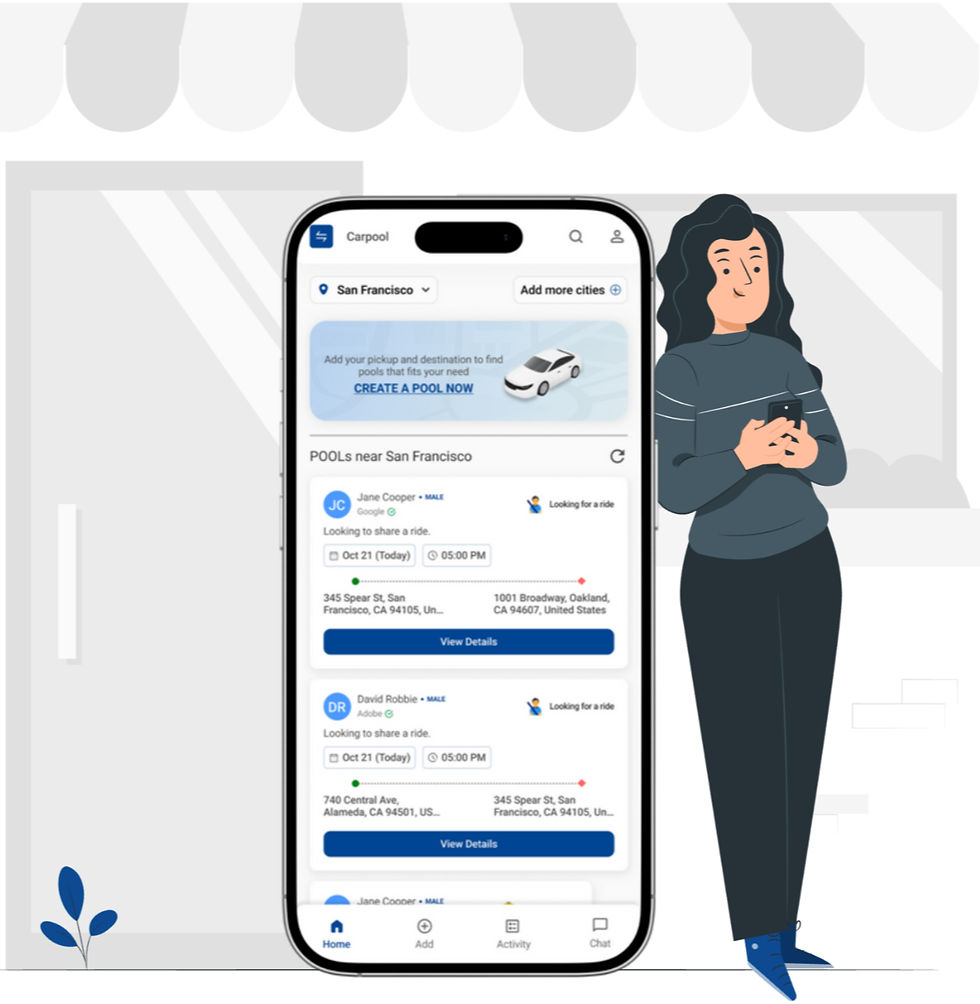The Hidden Toll of the Daily Commute on Your Mental Health
- Anushka Jain
- Sep 3, 2025
- 4 min read

Daily commute on a blue Monday Morning
It’s a blue Monday morning. You’re in your car, alone, clutching that cup of black coffee. The sky is grey, traffic is at a standstill, and the constant honking makes your head throb before the day even begins. Your phone buzzes, three missed calls from your boss already. You glance at the time and realize you’re late again.
This isn’t just a one-off nightmare. This is your Monday-to-Friday routine of daily commute. And the thought that tomorrow, and the day after, and the week after will be the same is enough to make anyone feel trapped.
Instead of starting your day fresh, energized, and maybe even listening to music at home with a sense of calm, you spend it stuck in a metal box on the road, surrounded by strangers who are equally annoyed, equally exhausted, equally drained.
If you spend one to two hours commuting every day, have you ever wondered what it’s really costing you, beyond just fuel and time?
The Hidden Mental Health Toll
Stress & Anxiety- Traffic jams and train delays aren’t just inconveniences. They spike cortisol, the stress hormone. Every honk, every red light, every minute spent staring at the clock raises that anxiety meter. And unlike other stressors, this one is guaranteed to hit you twice a day.
Burnout- You start your day already drained. By the time you arrive at work, the “battery” is half gone. By evening, it’s fully depleted. There’s little energy left for family, friends, or yourself. Over time, this becomes a cycle of constant fatigue.
Wasted Hours- The average commuter spends hundreds of hours per year in transit, equivalent to weeks of their life. Imagine what you could do with that time: sleep more, pursue a hobby, spend time with loved ones, or even just breathe a little.
Isolation- Solo driving often feels lonely. Humans are social creatures, yet our commutes isolate us, sealed in cars or packed into trains where no one makes eye contact. And let’s be honest, we all secretly want to romanticize our commute, windows down, music blasting, feeling like the main character. But too often, it feels less like a movie and more like servitude.
The Physical & Emotional Chain Reaction

Long commutes don’t just eat into your mood; they ripple across your entire lifestyle.
Less sleep + less exercise = irritability: The time lost commuting is often stolen from rest and self-care.
Emotional spillover: That frustration doesn’t stay on the road. It shows up at work in snappy replies, or at home when you’re too drained to engage.
Accumulated micro-frustrations: Honking, crowded spaces, weather delays, all those “small” irritations pile up until they’re not so small anymore.
And let’s face it: nobody enjoys dealing with the perpetually grumpy co-worker. We crave that morning sunshiny energy, the smile that says, “I’ve got this.” Instead, the commute too often ensures the opposite.
Reframing the Commute

But here’s the twist: commuting doesn’t have to feel like dead time. What if those hours could be lighter, healthier, maybe even enjoyable?
Some small shifts can reframe the way we travel:
Shared rides (carpooling): Share the responsibility, take turns driving, reduce stress, and add social connection.
Podcasts, audiobooks, or meditation apps: Turn “wasted” time into learning or relaxation time.
Flexible schedules or remote days: Even one day less on the road can make a huge difference.
Micro-adjustments: A scenic detour, a curated “wind-down” playlist, or walking a portion of your commute can turn it into an intentional ritual.
To make life easier, we have to adapt, not just endure. Whether it’s a mindfulness routine or keeping your sanity with something like POOLit Carpool, your commute can shift from something you dread to something that feels more manageable. And don’t forget your evening rewind routine: cutting off from the world for a few hours, reclaiming peace, and reminding yourself that you’re more than just the sum of your work hours.
Why Shared Rides Are a Mental Health Win

Carpooling isn’t just about splitting fuel; it’s about splitting the burden.
Less Stress: Not driving every single day gives your brain a break.
More Social Interaction: Small chats with fellow commuters can ease tension and lift your mood.
Sense of Community: You realize you’re not suffering alone. There’s solidarity in shared journeys.
Eco + Financial Perks: Less guilt about fuel costs and carbon footprints means fewer mental weights dragging you down.
With apps like POOLit, carpooling is no longer an awkward arrangement. It’s seamless, safe, and flexible. And suddenly, the commute that once drained you becomes lighter, maybe even enjoyable.

Final Thoughts: A Call to Rethink Your Commute
The truth is, your commute doesn’t have to steal your time, your energy, or your joy.
Person A drives solo every day: stressed, lonely, burned out. Person B carpools a few days a week: relaxed, chatting, saving money, arriving lighter.
Both spend the same hours on the road. But one feels drained, the other feels connected.
Perhaps it’s time to reconsider your approach to movement. Your commute doesn’t have to drain you; it can actually become a part of your day you look forward to. All it takes is choosing smarter, healthier, and more connected ways to travel.





Comments